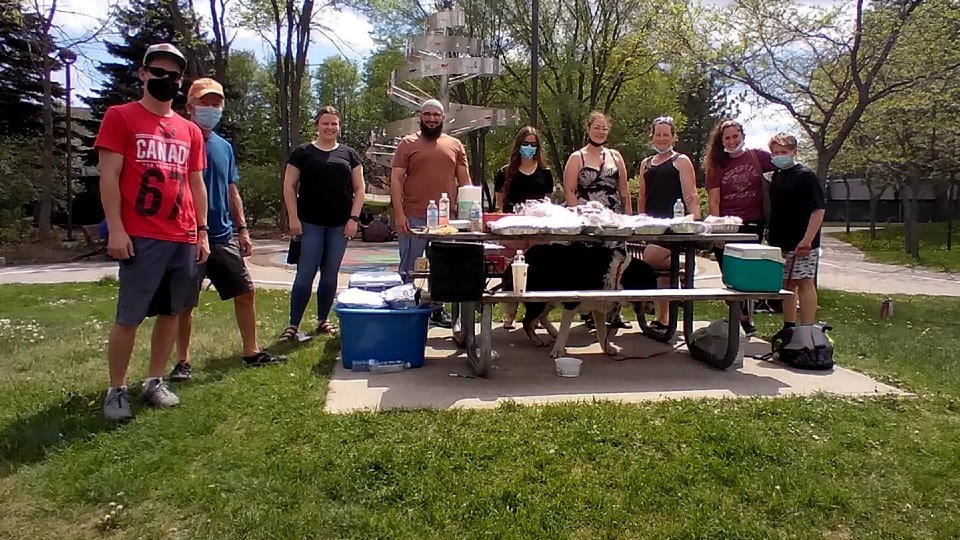The Go-Give Project, a group who invest their own money to help the vulnerable populations of Sudbury, have gone from fixing 35 sandwiches to help the hungry downtown, to attending nine stab wounds in the last six weeks.
They are also facing violence themselves. But they refuse to give up.
The began quietly in October of 2020, but found the need to incorporate for insurance reasons. Now, a registered charity, the Go-Give Project is focused on avoiding overlap with other services available. That’s why they specialize in overnight outreach.
“Our goal is not to duplicate any other services. We have phenomenal needle exchange programs, (and) we have excellent daytime resources,” said Evie Ali, founder and operations manager of the Go-Give Project. The team noticed that during the night and in winter months, there was a gap in services. “There was nobody to check on these people. We did have a couple of deaths, it was quite traumatic for some of our team members. But it was also a really good reality check for what is going on during the night.”
Their client base was approximately 100 people, but rising as high as 161 on some recent nights. To ensure their clients are getting what they specifically need The Go-Give project focuses on things like harm reduction, the needle exchange program with Public Health Sudbury & Districts, and working with community partners as well as bylaw officers. “(Bylaw officers) Brad and Mohammed have been so kind and compassionate on our journey and have provided an absolute staple.”
Ali said the Go-Give team of six volunteers has now built trust with the vulnerable community downtown. “So now we just try to work with them, to balance the nighttime as best as we can.”
The balance has become increasingly tenuous as of late.
“For us in particular, the past six weeks have been particularly rampant with violence,” said Ali. “We are not unaccustomed to seeing it, especially towards the end of the month when money is very tight, you will see violence in the downtown core.” Ali said that this increase in violence has not only included nine stabbings. “Our team has also been assaulted in the process.”
In the last few weeks, tents have been set ablaze, and Ali said one client was beaten with a bag of bricks. “This is a very real situation,” said Ali. “And unless you're out there at 3 a.m. trying to help these people, you're really not going to know about it.”
In Ali’s opinion, there are a number of contributing factors.
“One, the clients are constantly being removed from wherever they are,” said Ali. She also notes that housing, even affordable, is not always an option without support. “Unfortunately, the majority of our clients are not capable of obtaining or maintaining housing, they need the mental health services or the addiction services first, but our housing programs do not allow.”
Shelter space is also lacking, said Ali.
“We only have one shelter, at this time since the closure of the YMCA, that was a provisional shelter, that means it's a low-barrier shelter.” Of the Go-Give clients, seven of the 161 are precariously housed.
“But there is a divide, whether it be racial, gender, or just personal differences,” said Ali. “We cannot have all of these same people in one area, it just doesn't work that way. And that's only natural with any population.”
Ali said in addition to that, there is the opioid crisis. “We're constantly seeing circulation of harder drugs, adverse side effects, things like that, trying to keep our communications open with public health, to keep the community aware, as best as we can. But again, it just really comes down to so many barriers.”
The removal of the encampments in Memorial Park, causing the dispersal of the Go-Give clients, has also added some difficulty. Since the June 30 dismantling and eviction, Go-Give has had to introduce daytime searches.
“We had daytime units that were circulating, trying to find our encampments,” said Ali. “At this time, we have 12 clients of our 161 to locate. We're hoping to resolve that within the next week.”
Ali said the first step to solving the problem is to understand the problem. That’s what they seek to do now.
In addition to including donation requirements on their Facebook page, everything from food to bug spray and sunscreen, the Go-Give Project is looking for volunteer cooks. As they are a registered charity, you can make monetary donations at their website. They are also hoping Sudburians will come out to their weekly Social Saturday event at Memorial Park.
“We just ask community members to come to the park, just to have a mini free bake sale and interact with these people, hear their stories,” said Ali. “They can see the people that we’re telling them so much about, so that they can recognize the humanity in these people.”
Ali also asks that those who have nothing nice to say, should say nothing.
“These people are people, humans,” said Ali. “If you see them in the streets and you can't say something nice or do something good, don't do anything at all.”
